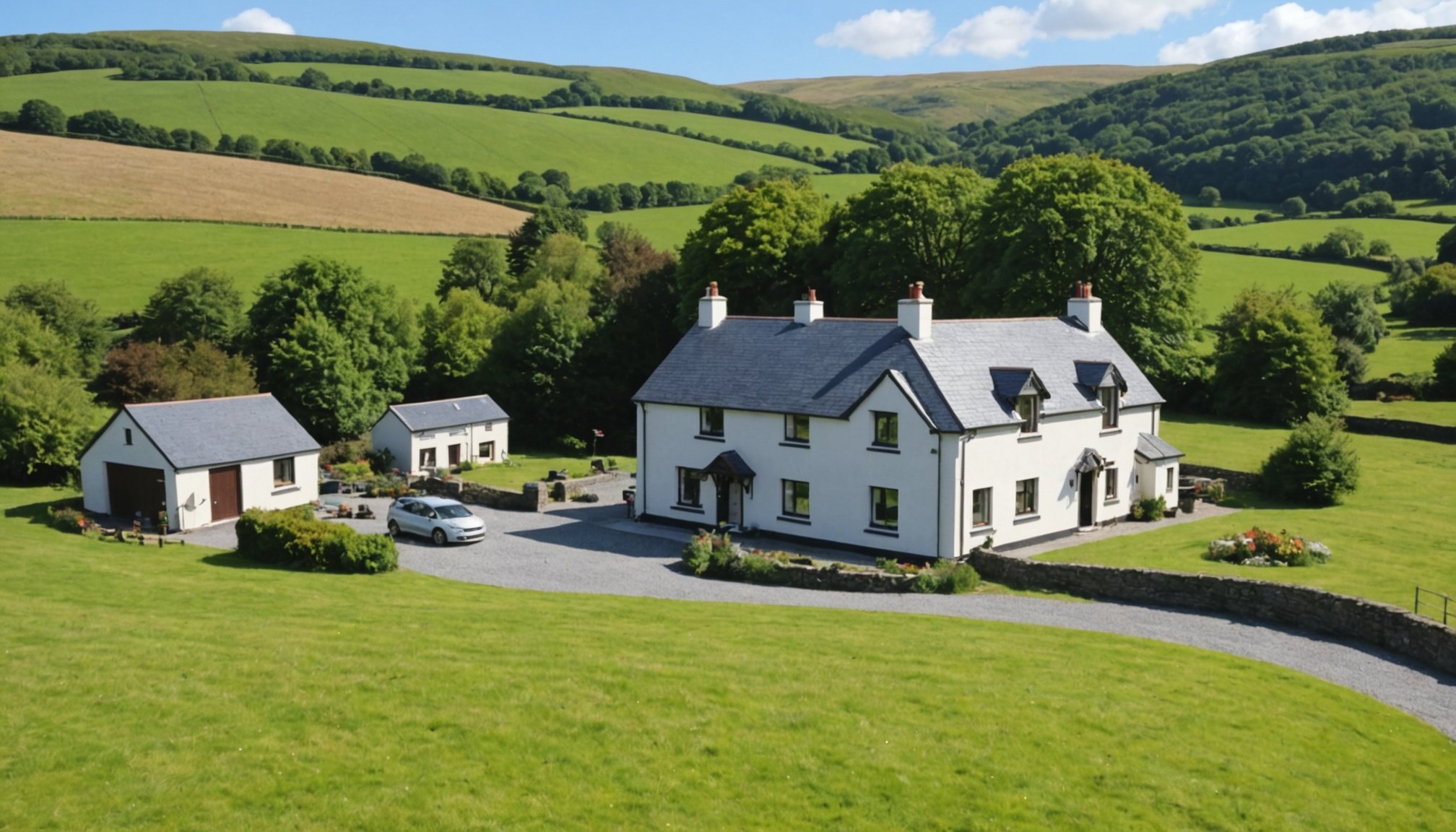Overview of Geothermal Heating
Geothermal heating is a sustainable home solution that leverages the Earth’s natural warmth, making it an efficient energy source. Geothermal heating systems work by harnessing stable underground temperatures through a series of pipes, known as a ground loop, circulating a heat-conducting fluid. This system transfers heat to or from the ground, maintaining consistent indoor climates.
Compared with traditional heating methods, geothermal heating stands out for its remarkable energy efficiency. Where conventional heating often burns fuel directly, geothermal systems use less electricity, as they primarily move existing heat instead of generating it. This results in a significant reduction in energy consumption, translating into lower operating costs over time.
Also to see : Revitalizing Urban Landscapes: Harnessing Public Green Spaces for Vibrant Community Connections
The importance of energy efficiency in rural homes is paramount, particularly in isolated areas where access to traditional heating fuels can be limited or expensive. Geothermal systems offer a practical solution by reducing reliance on fossil fuels while providing a reliable heat source. Rural homes benefit from the consistent performance and potential savings on energy bills.
Integrating geothermal heating not only supports energy efficient policies but also aligns with environmental goals, as it utilises renewable resources with minimal ecological disturbance. This makes it an attractive option for homeowners seeking sustainable home solutions.
This might interest you : Maximizing Community Impact: Innovative Approaches for Property Developers in UK Housing Projects
Benefits of Geothermal Heating for Rural Welsh Properties
Rural Welsh homes are increasingly turning to geothermal heating due to its compelling advantages. This innovative system brings about a notable reduction in heating costs, offering substantial long-term savings. Unlike traditional heating methods that incur ongoing fuel expenses, geothermal systems require minimal electricity, leading to consistent energy savings.
Moreover, installing a geothermal system can significantly increase property value. Homes equipped with sustainable technologies often attract environmentally-conscious buyers, thus enhancing marketability and resale potential. This long-term investment is not only financially wise but also aligns with modern sustainability expectations.
Aside from the economic benefits, the installation of geothermal heating promotes enhanced comfort and maintains consistent indoor temperatures year-round. This is particularly valuable in Wales, where the climate can be unpredictable. Geothermal systems harness the Earth’s stable temperatures, providing a reliable and comfortable heat source.
In essence, the adoption of geothermal heating systems in rural Welsh properties offers numerous rewards. Homeowners benefit both financially and in terms of comfort, while also making a positive environmental impact. This approach ensures sustainable, efficient, and cost-effective energy solutions, contributing to an overall improved living standard.
Environmental Impact of Geothermal Heating
Geothermal heating is favoured for its positive impact on the environment, particularly through the significant reduction of greenhouse gas emissions. By relying on the Earth’s steady underground temperatures, these systems minimise reliance on fossil fuels, thus lowering carbon footprints. This makes geothermal a key player in efforts to mitigate climate change.
In rural areas, the use of renewable energy sources such as geothermal can greatly benefit the local ecosystem. By reducing air pollution and conserving natural resources, these systems help preserve the unique landscapes and biodiversity. Unlike traditional heating options, which often involve fuel extraction and combustion, geothermal systems harness existing environmental energy with minimal ecological disruption.
Consideration for local wildlife is also important. Geothermal installations typically use shallow ground loops, ensuring minimal interference with wildlife habitats. Long-term, the energy savings and environmental benefits provide strong arguments for incorporating geothermal heating as a sustainable practice.
Thus, geothermal heating is not just an energy-efficient solution, but also a responsible environmental choice. It promotes sustainability while supporting the ecological balance of rural areas, aligning with broader ecological goals and community values.
Installation Considerations for Homeowners
When planning for a geothermal system installation, homeowners must address several crucial factors. It’s vital to assess the available space and soil type on the property. The amount of land impacts the placement of ground loops, a key component in harnessing the Earth’s subsurface energy. Additionally, the soil’s thermal conductivity will affect the system’s efficiency, so it must be suitable for heat exchange.
Consulting with experienced professionals is essential for navigating these requirements. Certified installers will conduct a thorough property assessment to determine the most effective system design. This usually involves soil testing, mapping out underground utilities, and ensuring compliance with local building codes.
The installation process itself is intricate and typically spans several weeks. It includes laying the ground loop system and connecting it to the heat pump inside the home. While the timeline can vary, having skilled professionals ensures minimal disruption and maximises efficiency.
Hiring certified experts not only optimises the installation but can also provide peace of mind. Their knowledge of tailored solutions and adherence to standards ensures your geothermal heating system is reliably integrated with long-term benefits for both energy efficiency and sustainability.
Cost Analysis and Savings of Geothermal Heating
Investing in geothermal heating systems comes with an upfront cost, yet this is often offset by substantial long-term savings. The initial investment may appear significant compared to traditional heating methods, but when analysed over time, the reduction in energy expenses becomes evident. Geothermal systems effectively minimise operational costs due to their high energy efficiency, leading to significant savings.
Homeowners in Wales have access to a variety of financial incentives and government grants aimed at promoting renewable energy adoption. These include potential rebates and tax credits, which can greatly ease the financial burden of installation. Such incentives make geothermal systems not just sustainable but also financially viable.
When comparing geothermal heating costs against traditional heating options, it’s clear that although installation costs are higher, the operational savings accumulated over the lifespan of the system make it a cost-effective choice. Returns on investment become apparent as energy bills decrease, proving advantageous in the long term.
Ultimately, understanding the financial landscape is crucial. By carefully considering these aspects, homeowners can make informed decisions about adopting geothermal heating, reaping both economic and ecological rewards.
Case Studies and Expert Opinions
Geothermal case studies illuminate the real-world successes of geothermal heating in rural Welsh homes. One standout story involves a century-old farmhouse, where the owners replaced an outdated oil system with a geothermal setup. Post-installation, their heating expenses dropped by 40%, showcasing significant energy savings.
Expert insights affirm these outcomes, emphasising how geothermal systems align with sustainability goals. Dr. Elin Morgan, a notable environmental scientist, points out that “the primary advantage of geothermal is its reliability and minimal environmental impact,” underscoring the benefits even in varied Welsh climates. These systems dramatically reduce reliance on non-renewable sources, positioning geothermal heating as both ecologically and economically viable.
Testimonials from homeowners further fortify geothermal’s appeal. One resident shared: “Switching to geothermal was a game-changer; comfort levels improved, and our carbon footprint decreased.” This resonates with many who, like him, appreciate the blend of economic and environmental benefits.
As success stories proliferate, expert advocates predict widespread adoption of these systems, driven by their proven performance and the growing demand for green energy solutions. These examples provide a comprehensive view of geothermal heating’s potential in revolutionising energy consumption in rural settings.
Practical Tips for Homeowners Considering Geothermal Heating
Embarking on the geothermal heating journey can be rewarding for homeowners seeking efficient and sustainable energy solutions. To evaluate if a home is suitable for geothermal, consider the available land and the soil type. A small yard might limit system options, while soil with poor thermal conductivity may hamper efficiency.
Conducting comprehensive research before installation is crucial. Access local resources and connect with geothermal experts to gain valuable insights and support. Several online platforms and local governmental bodies offer information on energy solutions, helping homeowners make informed decisions.
Community involvement can be an underestimated asset. Engaging with neighbours who have installed geothermal systems can provide a wealth of shared experiences, from installation to operation. Their firsthand knowledge often equips potential adopters with practical advice on system maintenance and performance.
Consider exploring financial incentives and local grants specifically designed for renewable energy projects. These incentives can significantly ease the initial investment and are essential to understand alongside practical aspects.
For homeowners seriously contemplating this sustainable energy switch, diving into the world of geothermal heating armed with community stories, expert guidance, and proper evaluation methods ensures a smoother transition to efficient, eco-friendly living.










